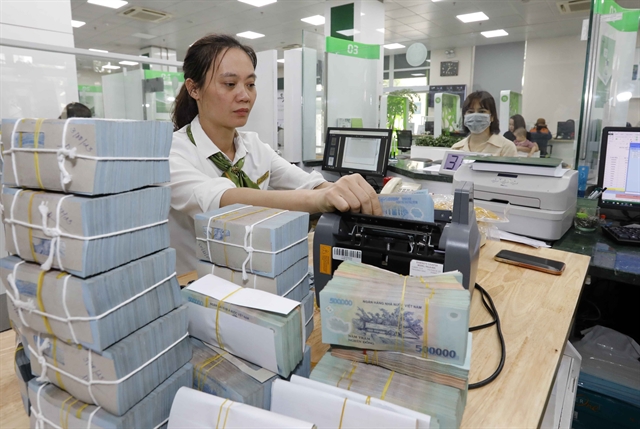 Economy
Economy


|
| Outstanding loans of the whole economy surpassed VNĐ12.3 quadrillion in the first five months of 2023, an increase of 3.17 per cent compared to the end of 2022. VNA/VNS Photo Trần Việt |
HÀ NỘI — Low credit growth has made large banks curb capital mobilisation and implement solutions for attracting borrowers.
According to the State Bank of Việt Nam (SBV), outstanding loans of the whole economy surpassed VNĐ12.3 quadrillion in the first five months of 2023, an increase of 3.17 per cent compared to the end of 2022.
This growth rate was lower than the rate of 8 per cent in the first five months of 2022. It showed that the capital absorption of the economy was still weak.
SBV deputy governor Phạm Thanh Hà said manufacturing enterprises are still facing difficulties in the consumption of products, leading to lower demand for new loans for production.
For small and medium-sized enterprises, some with weak financial situations have had no feasible plans, so they have not met the bank's loan requirements.
Regarding real estate credit, many real estate projects have faced difficulties, including legal problems, so the credit demand for real estate has also decreased.
According to SSI experts, the weak demand for capital was the main reason for the lower credit growth in the first five months of the year.
The experts have quoted the forecasts of commercial banks as saying that the credit demand was low in the second quarter of 2023. This demand is unlikely to increase sharply in the second half of the year because the businesses are still facing many difficulties, although lending interest rates have dropped significantly after SBV's three times cutting the policy interest rate from March to May.
The average lending interest rate, excluding incentives, was 12.5 per cent per year, down about 2.2 per cent from the end of 2022 but still about 2 per cent higher than the rate in 2019, according to SSI.
Meanwhile, according to the latest data of SBV, the average lending interest rate for new loans is at 9.07 per cent a year at present, down 0.9 per cent compared to the end of last year.
Commercial banks have all lowered lending rates to stimulate investment and consumption demand, but the new interest rates are mainly applied to new loans. Only a few commercial banks (mainly state-owned commercial banks) reduce interest rates on existing loans.
Agribank is the bank with the most attractive lending rates in the system, but it is not easy to have credit growth.
This bank's credit growth reduced in the first four months of the year and only recovered in May 2023. The difficulties of the domestic market, including weak consumption of agricultural products, caused a strong reduction in credit demand, according to Agribank.
VietinBank's credit growth reached 6 per cent in the first five months, the highest among state-owned commercial banks. However, a VietinBank leader said that in May 2023, its credit growth began to decline.
Leaders of many banks have admitted that capital absorption of the economy is too low even though the interest rates have cooled down. This causes big banks to curb the mobilisation of capital and also have solutions to attract more borrowers.
A BIDV leader said with dozens of credit institutions, there are many chances for businesses to access credit. Many banks have strict regulations for lending activities, but there are some others without strict regulations, so businesses have more opportunities to borrow capital.
At four large state-owned banks, including Vietcombank, Agribank, VietinBank and BIDV, the highest interest rate is 6.8 per cent per year for a 12-month term.
At the same time, these banks are striving to reduce costs and further cut deposit interest rates to continuously cool down lending rates.
Lê Thanh Tùng, a member of VietinBank's board of directors, told nhandan.vn that since the end of February, many banks have continuously announced interest rate reductions and launched credit packages to stimulate borrowing activities.
However, the number of dissolved and bankrupt enterprises was significantly higher than that of newly established enterprises. That proves that businesses face so many difficulties.
Therefore, besides the banks' solutions, the SBV deputy governor said that the stimulative solutions for the economy are very important. Ministries and sectors should continue to promote supportive policies for the development of enterprises, and remove difficulties in the consumption market and the real estate market.
BIDV will continue to reduce the lending interest rates to stimulate the investment and consumption needs of people and businesses, thereby helping recover credit growth.
VietinBank is striving to accelerate the implementation of the 2 per cent interest rate support package and implement Circular 02 on debt structure. VNS




